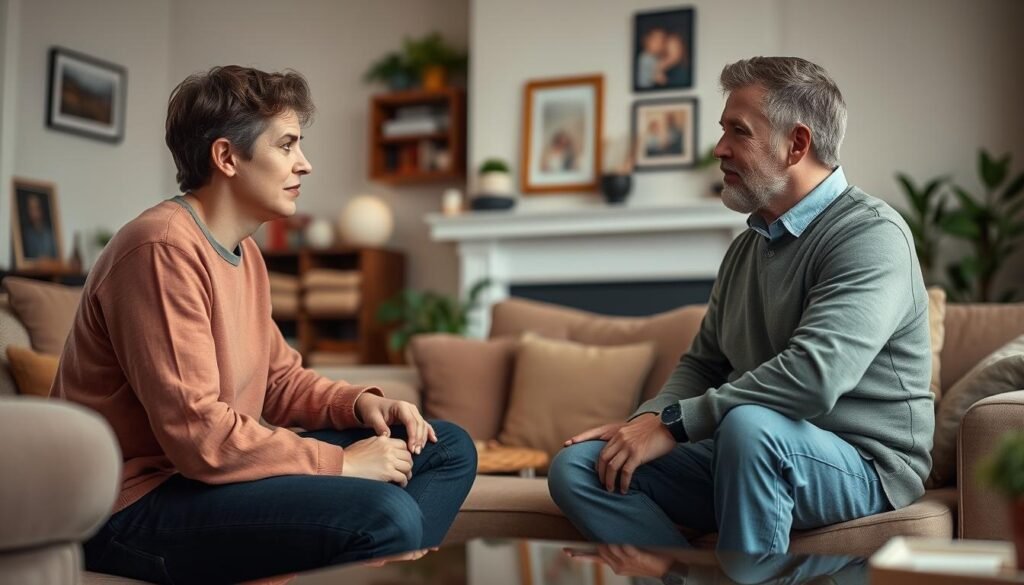Relationships can be complex, and conflicts may happen. Conflict resolution in relationships is key; with the right strategies, these challenges can help grow and strengthen the bond between partners. This guide will show you how to resolve conflicts, using insights from experts.
“Anger is an acid that can do more harm to the vessel in which it is stored than to anything on which it is poured.” – Mark Twain
Key Takeaways
- Understand the common causes of relationship conflicts and their impact
- Develop effective communication skills, including active listening
- Cultivate emotional intelligence to navigate conflicts with empathy
- Explore the art of compromise and finding win-win solutions
- Learn anger management techniques to express emotions in a healthy manner
- Establish healthy boundaries and seek professional help when needed
- Rebuild trust and strengthen relationships after conflict resolution
Understanding the Roots of Conflict
To fix relationship conflicts, we need to find out why they happen. Often, it’s because of bad communication, different values, and unmet emotional needs. Knowing this helps us take steps to solve these problems.
Common Causes of Relationship Conflicts
- Poor communication: Not talking openly, misunderstandings, and not listening well can cause fights.
- Differing values and expectations: Disagreements over lifestyle, money, and future plans can stress a relationship.
- Unmet emotional needs: Feeling ignored, resentful, or unsupported can lead to conflicts.
- Trust issues: Betrayals, cheating, or hiding things can damage trust.
- Power imbalances: When one person has more control or does more work, it can cause power struggles.
The Impact of Unresolved Conflicts
Ignoring relationship conflicts can hurt the relationship a lot. It can make communication worse, create distance, and hurt intimacy. In bad cases, it might even end the relationship. It’s key to solve conflicts early to keep a relationship strong and happy.
| Negative Impact of Unresolved Conflicts | Positive Outcomes of Effective Conflict Resolution |
|---|---|
| Emotional distress and resentment | Stronger emotional bond and mutual understanding |
| Deterioration of communication and trust | Improved communication and trust |
| Increased risk of relationship breakdown | Healthier, more fulfilling relationship |
By knowing why conflicts happen and their effects, we can work on fixing them. This leads to better, happier relationships.
Effective Communication Strategies
Good communication is key to solving conflicts in relationships. By learning how to talk well, partners can understand each other better. Active listening is a big part of this.
Active Listening: A Key to Mutual Understanding
Active listening means really getting what your partner is saying. You don’t interrupt or think about what to say next. It’s about listening fully, without distractions.
By listening well, you show your partner you care about their thoughts and feelings. This builds trust and respect between you.
- Maintain eye contact to show your partner you are fully present.
- Paraphrase what your partner says to ensure you’ve understood correctly.
- Ask open-ended questions to encourage your partner to elaborate.
- Avoid interrupting or formulating your response while your partner is speaking.
When partners listen actively, they can find the real reasons for conflicts. They can then work on solutions that meet both of their needs. This helps solve problems and makes the relationship stronger.
“The most important thing in communication is to hear what isn’t being said.” – Peter Drucker
Learning to communicate well, especially through active listening, helps solve relationship problems. It helps partners understand and respect each other. Together, they can find solutions that make their relationship better.

Emotional Intelligence and Conflict Resolution
Emotional intelligence helps us understand and manage our feelings and those of others. It’s key for solving conflicts well. When we grow our emotional intelligence, we can handle disagreements better. This leads to better solutions.
At the core of emotional intelligence is knowing how to handle our emotions well. When a conflict comes up, those with high emotional intelligence can spot the source of their feelings. This could be anger, frustration, or sadness. They can then manage their reactions and share their needs clearly. This helps in solving problems together.

Also, emotionally smart people can understand and feel with their partner. Knowing how the other feels helps in active listening. This way, both sides feel heard and respected, leading to solutions that work for everyone.
“Emotional intelligence is the ability to recognize your emotions, understand what they’re telling you, and realize how your emotions affect people around you. It’s a crucial ability that allows you to control your emotions and adapt to any situation.”
By growing emotional intelligence, couples can face conflicts better. This makes their relationship stronger. It builds a deeper connection and lasting peace.
The Art of Compromise
In relationships, conflicts are a normal part of life. The real challenge is finding solutions that work for both sides. Compromise is not about giving up, but finding a balance through understanding and negotiation.
Finding Win-Win Solutions
The secret to good compromise is looking for win-win solutions. This means listening well, sharing concerns, and finding ways to meet everyone’s needs. By focusing on what we agree on, we build respect and strengthen our bond.
Compromise needs creativity, empathy, and a real effort to see things from another’s point of view. Open talk helps us find common goals and new ways to meet each other’s needs. This teamwork builds trust and deepens our connection, leading to lasting solutions.
“The art of compromise is finding that sweet spot where both parties feel heard, understood, and satisfied with the outcome.”
By learning the art of compromise and seeking win-win solutions, we can handle relationship conflicts better. This way, we not only solve immediate problems but also build a stronger, more lasting partnership.

Conflict Resolution in Relationships: Expert Tips
Relationships can be tough, but we can solve conflicts and grow closer. Leading experts share their best advice to help you handle disagreements well.
Prioritize Open Communication
Good communication is key to solving conflicts. Listen actively and let each person share their thoughts and feelings. Try to see things from your partner’s point of view, even if it’s different from yours.
Manage Your Emotions
Strong emotions can make conflicts worse. Take breaks to calm down before talking more. Speak kindly and use “I” statements to share your feelings.
Seek Compromise
Finding common ground is important. Look for solutions that work for both sides. Aim for a middle ground where both feel respected.
Rebuild Trust
Trust can be lost in conflicts. Admit and apologize for mistakes. Show you’re changing by being trustworthy over time.
Using these tips can help you deal with conflicts better. You’ll understand each other more and strengthen your relationship.

| Expert Tips for Conflict Resolution | Description |
|---|---|
| Prioritize Open Communication | Embrace active listening and seek to understand your partner’s perspective. |
| Manage Your Emotions | Take time-outs when needed and use “I” statements to express your concerns. |
| Seek Compromise | Explore creative solutions that address both parties’ needs and concerns. |
| Rebuild Trust | Acknowledge and apologize for any wrongdoings, and demonstrate a commitment to change. |
Anger Management Techniques
Anger is a natural emotion that can happen in many relationship conflicts. It’s important to learn how to express anger in healthy ways. This helps solve problems together. We’ll look at some effective ways to manage anger in relationships.
Mindfulness-Based Practices
Mindfulness is a great way to handle anger. It helps you be aware of your feelings and thoughts in the moment. This way, you can think before you act, avoiding quick reactions.
Effective Communication Strategies
Talking things out is key when you’re angry. Use “I” statements to share your feelings. This helps avoid blaming each other. Listening well and trying to see things from the other’s side also helps solve problems.
| Anger Management Technique | Description |
|---|---|
| Mindfulness-Based Practices | Cultivating self-awareness and being present in the moment to recognize and manage anger. |
| Effective Communication Strategies | Using “I” statements, active listening, and seeking to understand the other person’s perspective. |
| Physical Outlets | Engaging in physical activities, such as exercise or journaling, to release pent-up anger in a healthy way. |
| Cognitive Reframing | Challenging negative thought patterns and reframing anger-inducing situations in a more constructive way. |
Physical Outlets
Doing physical activities like exercise or journaling can help release anger. These activities give you a healthy way to express your feelings. They help calm your mind and body.
Cognitive Reframing
Cognitive reframing is another useful technique. It’s about changing negative thoughts into positive ones. This helps you see problems as chances to find solutions, not just obstacles.

Effective anger management in relationships means expressing feelings in a way that helps solve problems. By using these techniques, you can face challenges together with understanding and empathy. This leads to better outcomes for both of you.
Setting Healthy Boundaries
Creating and keeping healthy boundaries is key for building strong, lasting relationships. Boundaries define our personal space, emotional needs, and limits. They ensure respect and understanding with our partners.
There are different types of boundaries in relationships:
- Physical boundaries – respecting each other’s personal space and comfort.
- Emotional boundaries – expressing feelings and needs without fear of judgment.
- Sexual boundaries – talking about our desires and limits in intimacy.
- Financial boundaries – keeping our finances separate and our own.
- Time boundaries – finding a balance between alone time and shared activities.
Setting healthy boundaries can be tough, especially if we’re used to enabling others or finding it hard to speak up. But, the benefits are huge. Clear boundaries build trust, respect, and a deeper connection with our partners.
| Healthy Boundaries | Unhealthy Boundaries |
|---|---|
| Respecting each other’s personal space and needs | Invading privacy or disregarding personal boundaries |
| Openly communicating desires and limits | Expecting partner to “just know” what we want |
| Maintaining financial independence and transparency | Overspending or controlling each other’s finances |
| Balancing individual and shared time | Neglecting personal needs or becoming codependent |
By learning to set and keep healthy boundaries, we build relationships based on respect, trust, and growth. It’s a journey, but it’s worth it for the long-term health and happiness of our partnerships.
“The foundation of a strong relationship is not how much you love your partner, but how well you respect each other’s boundaries.”

The Role of Empathy in Conflict Resolution
Empathy is key in solving conflicts. It lets us understand and share feelings with others. This way, we can see things from each other’s point of view, be kind, and find common ground. This leads to better ways of solving problems together.
Seeing the Other Person’s Perspective
Trying to see things from our partner’s side opens up real talks and solutions. Empathy lets us walk in their shoes, feel their feelings, and understand their needs and worries. Seeing things from their side often helps us find ways to agree and solve problems together.
- Listen carefully to your partner’s worries without interrupting or guessing.
- Ask questions to really get what they’re thinking.
- Show you get their feelings, even if you don’t agree with everything.
Showing real interest in what your partner thinks helps build respect and understanding. This is the start of solving problems together well.
| Benefits of Empathy in Conflict Resolution | Outcomes |
|---|---|
| Deeper understanding of partner’s needs and concerns | Improved communication and conflict resolution |
| Increased compassion and willingness to compromise | More positive and constructive conflict resolution |
| Identification of common ground and shared goals | Stronger, more resilient relationships |
Empathy is a strong tool for solving conflicts. By seeing the world through our partner’s eyes, we can deal with problems better. We do this with kindness, understanding, and a wish to find good solutions together.
“Empathy is about finding echoes of another person in yourself.” – Mohsin Hamid
When to Seek Professional Help
Many relationship conflicts can be solved through good communication. However, there are times when professional help is needed. This is especially true when arguing patterns repeat, compromise is hard, or trust and intimacy are lost.
The Benefits of Couples Therapy
Going to couples therapy offers a safe space to tackle issues. A professional can help understand the causes of conflicts. They can also teach better communication and how to manage strong emotions.
Therapy helps partners see things from each other’s point of view. It teaches setting boundaries and finding solutions that both are happy with. This strengthens the relationship and builds trust.
- Improved communication and understanding
- Enhanced emotional intimacy and trust
- Development of conflict resolution skills
- Constructive strategies for managing anger and other intense emotions
- Increased sense of partnership and commitment to the relationship
Seeking professional help can help couples overcome tough challenges. The benefits of couples therapy are huge. They help partners navigate their relationship and build a strong bond of respect and care.
Rebuilding Trust After Conflicts
Conflicts can damage trust in a relationship. Rebuilding trust after conflicts is a delicate and crucial process. It requires patience, commitment, and a genuine desire to mend the relationship. Trust is like a fragile crystal vase – once broken, it takes time and care to restore it.
To start rebuilding trust, taking responsibility for one’s actions is key. Acknowledging the harm caused and expressing genuine remorse is important. This shows a willingness to make amends. Then, take concrete steps to make things right, like apologizing sincerely or changing problematic behaviors.
- Communicate openly and honestly about the conflict, its impact, and the desire to rebuild trust.
- Consistently demonstrate reliability and commitment to the relationship through small, everyday actions.
- Seek the assistance of a trained mediator or counselor to facilitate the trust-rebuilding process, if necessary.
Rebuilding trust after conflicts is a gradual process. It requires patience, empathy, and a genuine commitment to the relationship. By taking responsibility, making amends, and consistently showing trustworthiness, couples can restore their relationship’s foundation. They can emerge stronger than before.
“Rebuilding trust is like a dance – it takes time, practice, and a willingness to learn new steps together.”
Conflict Management Techniques for Lasting Relationships
Managing conflicts well is not just about solving one problem. It’s about keeping the effort up over time. We’ll look at ways couples can handle disagreements and keep their relationship strong.
Good communication is key. This means listening well and speaking clearly. We should try to really get what our partner is saying. And we should share our thoughts and feelings without blaming.
Being willing to compromise is also important. Couples who succeed find ways to please both sides. They might negotiate or find new solutions that work for everyone.
| Conflict Management Technique | Description |
|---|---|
| Active Listening | Focusing on understanding your partner’s perspective, rather than just waiting to respond. |
| Compromise | Seeking mutually beneficial solutions that address the core needs of both individuals. |
| Emotion Regulation | Developing the ability to manage strong emotions, such as anger or frustration, in a healthy way. |
| Boundary Setting | Establishing clear boundaries and expectations to create a safe, respectful environment. |
It’s also important to manage our emotions. Learning to handle our feelings helps avoid making things worse. This way, we can find better ways to solve problems.
Setting clear rules and expectations helps too. Knowing what’s okay and what’s not makes it easier to agree and respect each other.
Using these techniques, couples can create a strong, lasting bond. With effort and a desire to grow together, they can face challenges and come out stronger.
Cultivating a Mindset of Mutual Respect
At the heart of successful conflict resolution is mutual respect between partners. It’s key to have respect, empathy, and understanding. This creates an environment where both feel valued and heard. By focusing on respect, couples can handle disagreements better and find lasting solutions.
Active listening is a big part of mutual respect. When talking, it’s important to really listen to your partner without interrupting. This helps understand their concerns and makes for better conversations.
Also, showing gratitude for your partner’s efforts, even in tough times, strengthens respect. Acknowledging their contributions can ease tense moments and help solve problems together.
- Actively listen to your partner’s perspective without interruption
- Express gratitude and appreciation for your partner’s efforts
- Approach disagreements with empathy and a willingness to understand
- Avoid blame-shifting and focus on finding mutually beneficial solutions
By focusing on mutual respect, couples can handle conflicts better. This strengthens their bond and makes their relationship more fulfilling. Respect is a guiding light, helping partners grow together with care and compassion.
“Respect for ourselves guides our morals; respect for others guides our manners.” – Laurence Sterne
Strengthening Family Bonds: Building Lasting Connections
Conclusion
In this guide, we’ve looked at many ways to solve conflicts in relationships. We’ve talked about how to improve communication, like active listening. We’ve also discussed the importance of emotional intelligence and finding common ground.
Using these tips can help you deal with problems and make your relationship stronger. You’ll learn how to handle anger, set boundaries, and know when to get help. This guide is full of practical advice to help you understand each other better.
Conflict is a normal part of any relationship. But how we handle it shows the true strength of our bond. By following these conflict resolution tips, you can work towards a more loving and respectful partnership.
